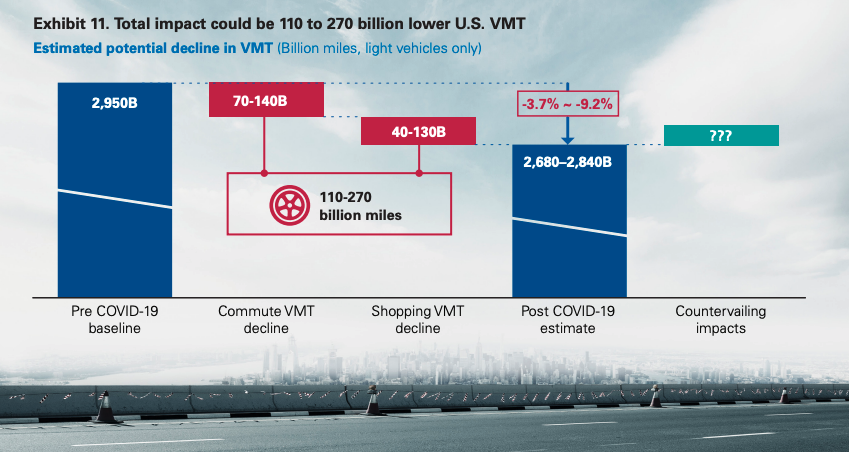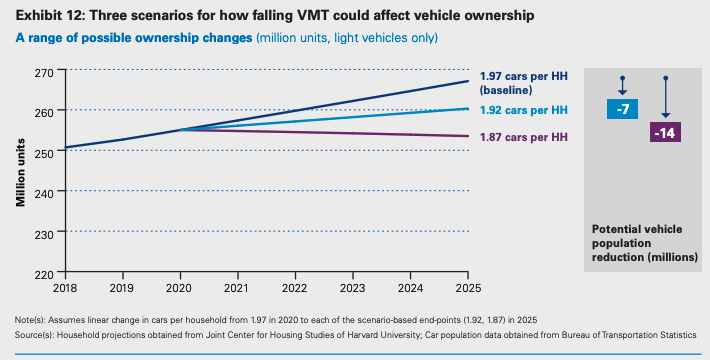‘Work-from-home’ will reduce U.S. driving by 270 billion miles per year from 3 trillion miles in 2019, KPMG study finds

With millions of people working from home to help slow the spread of the coronavirus, many Americans are driving less than they were before coronavirus hit. The work-from-home revolution has also led to slow oil demand and have led to an unprecedented fall in air pollution.
The slow oil demand is further confirmed in a new study conducted by consultancy firm KPMG International. According to the study, Americans racked up an astounding 3 trillion miles behind the wheel in 2019. That amounts to 337 round trips from Earth to Pluto. For six decades there has been a steady growth in “vehicle miles traveled” or VMT in auto industry jargon.
The study later looked at the two driving “missions” that were most affected by COVID-19: commuting and shopping. The firm found that these are the two main reasons why people own cars. Together, they find these two account
for nearly 40 percent of the 3 trillion annual miles, which amounts to 270 billion miles per year.
The effects of COVID-19 will be felt for years. The response to the virus has accelerated powerful behavioral changes that will continue to shape how Americans use automobiles. We believe the changes in commuting and e-commerce are here to stay and that the combined effect of reduced commuting and shopping journeys could be as much as 270 billion fewer vehicle miles traveled (VMT) each year in the US.

“For six decades, there has been a steady rise in the number of miles that Americans travel in automobiles every year. In 1960, total vehicle miles traveled (VMT) was 600 billion. By 2019, it was nearly 3 trillion and growing. Then came COVID-19. In 2020, this nearly unbroken streak appears to be ending. In the 2008-09 recession VMT growth dipped, but under COVID-19 stay-at-home orders, automobile use plunged. Highways that had been choked
with rush-hour traffic were eerily empty. There were no trips to the mall, no ferrying kids to school and sports, no
nights out on the town. During April, VMT fell 64 percent below the usual level, or by 160 billion miles for the
month.1 In May, VMT was still down 40 percent compared with May 2019,” the study says.
The study went on to outline three unintended consequences of work-from-home revolution: automakers, retailers, and industries directly or indirectly related to transportation will take a massive hit for the next several years.
Falling vehicle miles traveled (VMT) would also affect used-car sales and aftermarket parts and service: less driving also means less wear and tear on vehicles, as well as a decline in traffic accidents, cutting into the lucrative collision parts business. Auto aftermarket suppliers will likely see a significant falloff in demand for replacement parts and maintenance services. – KPMG
KPMG outlines three scenarios of falling vehicle miles traveled will result in declining car ownership through 2025.

The key takeaways the report are clear: less commuting and shopping, less needs for cars, less demand for cars could lead to 14 million less car per year, higher commercial vehicle demand, and complex consumer behavior.
Every year, Americans drive nearly 3 trillion miles in cars. But COVID-19 has changed American life, including driving habits. After almost 60 years of largely uninterrupted growth, vehicle miles driven (VMT) in the U.S. will drop in 2020, and we estimate that enduring changes in driving habits could lead to a 9 to 10 percent drop in VMT. That would have significant impact on the auto industry and beyond.

The study concludes with the following: “COVID-19 is the defining event of 2020–and will continue to shape society, politics, and business for years to come.”




